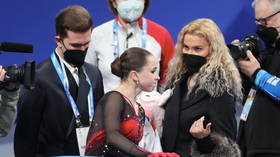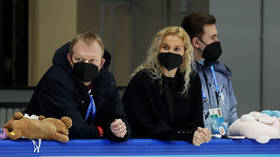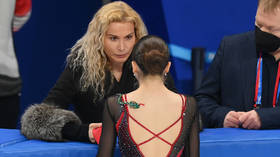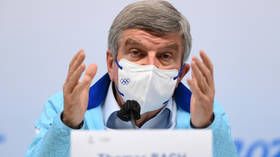Valieva coach reacts to criticism from Olympic chief
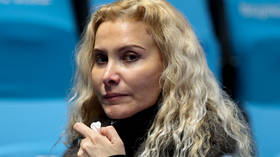
Russian figure skating coach Eteri Tutberidze has responded to International Olympic Committee (IOC) president Thomas Bach's suggestion that she treated Kamila Valieva with "tremendous coldness" as the Winter Olympics star left the ice distraught following her final performance at the Beijing Games.
Bach, whose organization had announced that it would not hold a medal ceremony if Valieva achieved a podium position in the individual competition, said that he had been "disturbed" by what he perceived as "chilling" behavior from Valieva's circle after the pre-Games favorite to win gold finished fourth with an uncharacteristically error-strewn display.
Hugely successful Tutberidze has faced fierce criticism over her part in a troubling Games for Valieva after the 15-year-old's positive test for a heart drug that is on the World Anti-Doping Agency's banned list, with the news announced a day after she helped the Russian Olympic Committee (ROC) win gold in the team event.
The Russian Anti-Doping Agency (RUSADA) lifted a provisional suspension placed on Valieva over the test, which was taken at the Russian championships on December 25 and took more than six weeks to be returned from a laboratory accredited by WADA in Stockholm.
A Court of Arbitration for Sport (CAS) hearing at the Games ruled that Valieva could compete in the individual competition, although the case is ongoing and WADA is obliged to investigate Tutberidze and other members of the European champion's entourage under its rules over anti-doping cases involving minors.
Tutberidze is said to have asked Valieva to explain why she "let it go" as she left the ice after an underwhelming display by her exceptional standards, and was later seen putting an arm around her pupil as she sat in stunned silence while the results were read out.
The coach, who also guided Russian Alexandra Trusova to a silver medal and a historic moment as she became the first woman to land five quad jumps at the Olympics, issued one of her first public responses to the controversy when she replied to an Instagram post by legendary Russian ice dancer and coach Alexander Zhulin.
"I’m very grateful for the words of support," she said after Zhulin wrote an open letter to Bach about his comments.
"At this moment, I find myself at a loss over the assessment of our work by the esteemed Mr. Bach."
German lawyer Bach said he had watched the competition on television and been alarmed by the pressure and "immense mental stress" on Valieva.
"When I afterwards saw how she was received by her closest entourage with what appeared to be a tremendous coldness, it was chilling to see this.
“Rather than giving her comfort, rather than to try to help her, you could feel this chilling atmosphere, this distance.
"If you were interpreting the body language, it got even worse. There were even dismissive gestures. Can you really be so cold to your athletes?
"All of this does not give me much confidence in this closest entourage in Kamila, neither with regard to the past nor the future."
Former world and European champion Zhulin said he was "very surprised" by Bach's words.
"Coach Tutberidze has raised six Olympic medalists and four Olympic champions since 2014, and she probably knows how and what to say to her students after performances," he wrote.
"You, please, analyze your position in relation to a woman and a young girl, starting from February 8 this year.
"From the position of a man, you behaved, in my opinion, cruelly and incorrectly. At least not for you to teach manners to an outstanding coach."
Zhulin called the IOC "undoubtedly correct and logical" but called for WADA to change its policy on drugs that are not performance-enhancing.
The 1994 ice dancing silver medalist pointed to one of his pupils, Ekaterina Bobrova, who was not allowed to compete at the 2016 World Championships in his sport because traces of meldonium were detected in her body.
Bobrova's suspension for a tiny amount of the substance was subsequently lifted as part of a WADA amnesty amid uncertainty over how long it can stay in the body.
"She was fully justified in the CAS but the main thing is that traces of meldonium can remain in the body for the rest of her life," said Zhulin.
"This drug is completely unexplored and does not give any increase in results but it was put on the banned list in the most dangerous column."
Sporting insiders have pointed out that the drug found in Valieva's system, which is used to treat angina, is similarly unlikely to provide performance benefits to athletes.
CAS has confirmed that the drug could have come from a medicine taken by Valieva's grandfather.
Speaking after the announcement of Valieva's positive test, Tutberidze said she hoped "justice" would prevail and described her absolute certainty that Valieva is "innocent and clean."
"For us, that’s not a theory but an axiom – it doesn’t need to be proved,” she said.
“We haven’t abandoned the sportswoman [Valieva] by any means. We are with our sportswomen in tough times and happy times.”
Russian Deputy Prime Minister Dmitry Chernyshenko joined the chorus of critics who disapproved of Bach's remarks, accusing him of “weaving his own fictional narrative”.
"This is frankly inappropriate and wrong," Chernyshenko claimed to Inside the Games.
"Everyone recognizes the Olympics as the pinnacle of professional sport and every single athlete bears the hopes and dreams of their entire nation for their success.
"That is a known pressure and it is also what drives them forward with a fighting spirit. Win or lose, we know our athletes are world-beating – and they do too."
